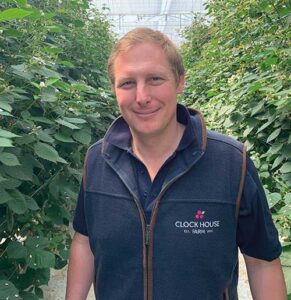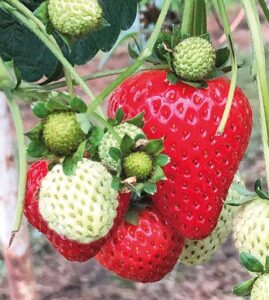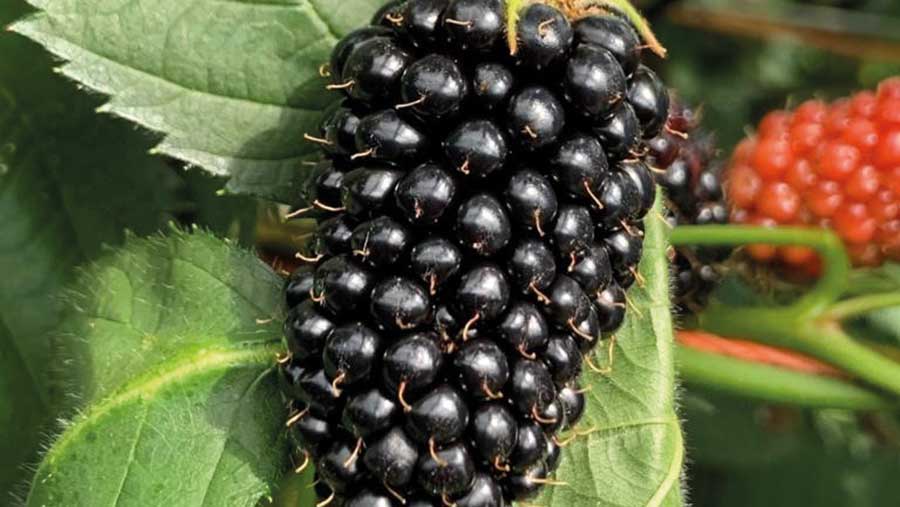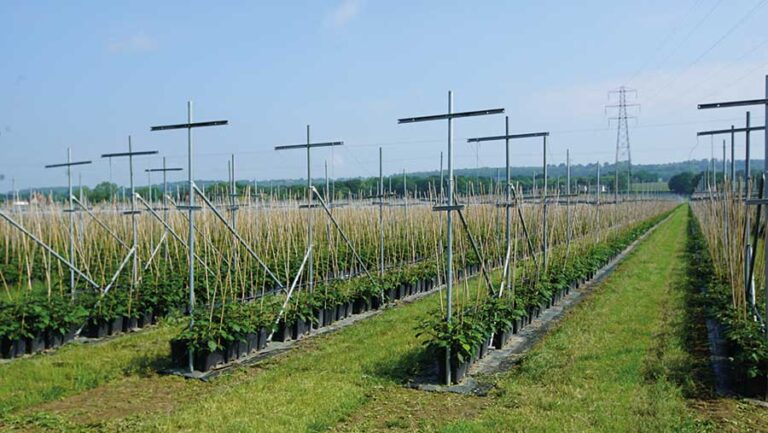Oli Pascall, managing director of Clock House Farm, is a fourth-generation fruit grower. His passion for growing and the ability to integrate innovation and sustainability into the operation has secured a bright future for this forward-thinking business.
Based just outside of Maidstone in Kent, Clock House Farm grows a significant proportion of the UK’s strawberries, raspberries and blackberries, with a smaller amount of top fruit – plums and apples. There are five main sites across the county, totalling more than 400ha.
 Are you the next Fruit Grower of the Year, or do you know someone who could be? Entries are open for the 2025 National Arable and Grassland Awards. Go online to enter or nominate someone.
Are you the next Fruit Grower of the Year, or do you know someone who could be? Entries are open for the 2025 National Arable and Grassland Awards. Go online to enter or nominate someone.
Oli became managing director in 2020 and the business has changed significantly in the past four years. New technologies have been introduced, dovetailing with the traditional methods of farming.
The team at Clock House Farm know they are custodians of the land they farm, and take their responsibilities seriously. Specific measures have been put in place to effectively manage and maintain the natural ecosystem, establishing a habitat that encourages fauna and flora to co-exist alongside commercial fruit production.
Stephen Wilson, compliance and technical manager, and Jane Peckham, recruitment manager, gave a little bit of background to the business.

Clock House Farm was established in 1903 by Clive Murdoch, initially as a mixed farm. In the late 1940s, Clive’s son, Robert, took over and the business transitioned to fruit production, with top fruit, hops, and cherries.
In the 1980s the business diversified into soft fruit and at the end of the decade Robert retired, handing the reins to his daughter, Camilla, and her husband, Robert Pascall. The business expanded rapidly, increasing from just 1ha to 100 ha of soft fruit and 100ha of top fruit.
Having completed his degree in agricultural business management, Oli joined the company in 2013 and managed one of the farm sites before becoming managing director, with his father stepping into the chairman role.
Land sharing and sparing
According to Stephen, the business has spent over a decade prioritising production and environmentally friendly measures equally. Since 2011, 38ha have been rewilded, transformed into nature reserve or otherwise adapted for Higher Tier Stewardship schemes.
This is alongside an additional 7ha of woodland being established and just over 5ha of flower meadows. This not only enables the business to meet its environmental goals, but it also focuses investment on the most productive land, ensuring the best possible return. Clock House Farm has also adopted integrated disease and pest management systems across its growing area.
This has included over 3km of native hedgerows, with windbreak trees, planted since 2021, the use of in-field trees, and pollinator and grass mixes planted on tracks and margins to encourage beneficial predators throughout the soft fruit areas.
To further minimise the use of chemicals on the produce, the company uses netting at high-risk periods to keep pests away and employs a disease risk modelling system to monitor crops and reduce the use of fungicides.
Passes with the mower have been reduced to enable more species to create habitats and when mowing alleyways within the orchards, cuttings are ejected towards the trees to create a natural mulch, which Oli says helps to maintain the correct moisture levels and puts nutrients back into the soil.
All these actions make up a part of the company’s net-zero objectives. Oli has proven to be forward-thinking when it comes to this process, investing in data systems that can monitor plant growth to assess the need and viability of inputs – reducing spend and carbon emissions through the growing chain.

One of the biggest projects Clock House Farm has been involved with is the Innovate UK Transforming Food Production Robotics Highway.
This £2.6m scheme has seen the installation of robots to monitor and treat soft fruit crops. Data from the units is transmitted to a central cloud system, enabling visual forecasting of yield, as well as using a UV crop protection system to limit the effects of mildew in strawberry crops.
“Using this same system, the robots can also release beneficial predators into the fruit crops, keeping pest pressure low,” says Stephen.
Waste management
Management of waste has been addressed across all levels of the business, and Clock House Farm continues to have conversations across the supply chain to further this.
Fruit that does not meet the minimum specification is exported off-farm to a local biodigester. Through Driscoll’s, which supplies the soft fruit varieties, the business is also looking closely at new genetic traits to reduce waste at the source and produce fruit that is more appealing to the consumer.
These include Victoria blackberries, which are larger than traditional blackberries and grow without producing thorns on the stem, making it more efficient to pick them.

Working with Driscoll’s and securing the supply of plants, three years ago Clock House Farm established Linton Growing. This vertical integration into plant propagation was initially conceived following Brexit, with Oli recognising that there would potentially be issues with supply.
“It also meant that we could control the quality and conformity of the fruit from the very beginning of the process through to retail,” explains Stephen. “It also helps us market our produce. Consumers like to buy British, and Clock House Farm fruit now has full traceability.”
After three years, Linton Growing is responsible for 100% of the soft fruit grown at Clock House, and the firm is looking to expand operations – providing British plants for other growers across the UK.
There has also been significant investment in the company’s water management, with drip irrigation enhanced by a Priva moisture analysis system that controls the system. Water is sourced from on-site reservoirs.
The company established its first in 1988, with plans to build one a year until 2026. Oli has installed a water-source heat pump, linked to the river Medway for one site, meaning that the environmental impact of heating the greenhouses has been reduced.
Stephen says this has also helped the company to extend the growing season.
The future of picking
Over half of the growing costs comes from labour, with up to 1,200 seasonal employees working with the business each year.
Where possible, the same workers are sourced each year, with some of the people with settled or pre-settled status moving from picking to the packhouse to extend their time on the farm.
Clock House Farm has accommodation available for up to 1,000 workers at any one time and has seen members of the team work their way up to senior positions.
“In many ways, we’re in a better position than some companies, because we offer that progression and we try to ensure that workers can return year after year,” Jane says. “However, we’re always looking at
ways to improve efficiency and reduce our costs.”
One of these ideas is automated carriages working alongside the pickers to ferry produce to the end of the field. “At the moment, a lot of time is wasted as the pickers carry produce out of the rows. If we could limit this, it would benefit us and benefit the pickers as well,” Stephen adds.


